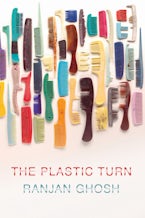Ghosh uses plastic metaphorically and in an innovative way to advance understanding of literature, art, and life in the present. In so doing, he develops a new material aesthetic, one that offers a new way to view history, ontology, and ecology as well as literature and the arts.
(Choice) Ecocriticism's ongoing heterogenization mirrors broader strides in the environmental humanities, including advances in green postcolonial analysis, ice humanities, plant studies, waste studies, and related ecohumanistic domains. As a case in point, a significant contribution to ecocritical examinations of waste is Ranjan Ghosh's The Plastic Turn. Through a material-aesthetic optic, Ghosh genealogizes the impact of the plastic polymer on critical theory and literary modernism
(The Year's Work in Critical & Cultural Theory) An original and worthwhile reading experience for all those concerned with the humanities, the Anthropocene, the written word and the ecology of good and bad ideas. Ghosh's The Plastic Turn not only breaks the mold of literary criticism but asks others to refashion critical literature in elastic, versatile and plastic ways.
(LSE Review of Books) Ranjan Ghosh's The Plastic Turn joins a clutch of books and essay collections that consider plastic well beyond its material forms to become a conceptual matter—even a dimension—that has changed the way we live, think, relate to others, and imagine otherness itself.
(Critical Inquiry) Ranjan Ghosh's The Plastic Turn is the first in a trilogy intended to theorize the aims, scope and effects of a 'plastic Humanities.'
(SubStance) Like a plastic bomb, Ghosh's text explodes. The remnants, the structure that survives this gestative explosion, is a confetto of nomadic polymers, hailing us to see them, follow them everywhere. With propulsive prose seemingly charged by an indefatigable, feverish energy, Ghosh's book is rich and complex, offering a vertiginous kaleidoscope of reflections on "plastic" that moves breathlessly—a churning worthy of the moniker of material aesthetic theory machine—from micro to macro, molecular to molar, and seemingly everywhere beyond and between.
(Interdisciplinary Literary Studies) Ghosh thoroughly considers the roles and impacts of plastics, primarily as metaphor and figuration, to craft an eye-opening look at a past, present, and future characterized by plastic thinking. His book explores plastic as both a material and a metaphor, considering the ways that plastic has become entangled, intentionally or not, with human lives and thinking.
(American Book Review) Ghosh's project performs its own plasticity. The Plastic Turn is itself highly additive, accumulative, malleable, and plastic, especially when Ghosh turns to listing plastic's many properties that both build and expand upon the previous... this book offers a vital contribution to materialist scholarship within both the environmental humanities and contemporary poetics.
(Journal of Modern Literature)


